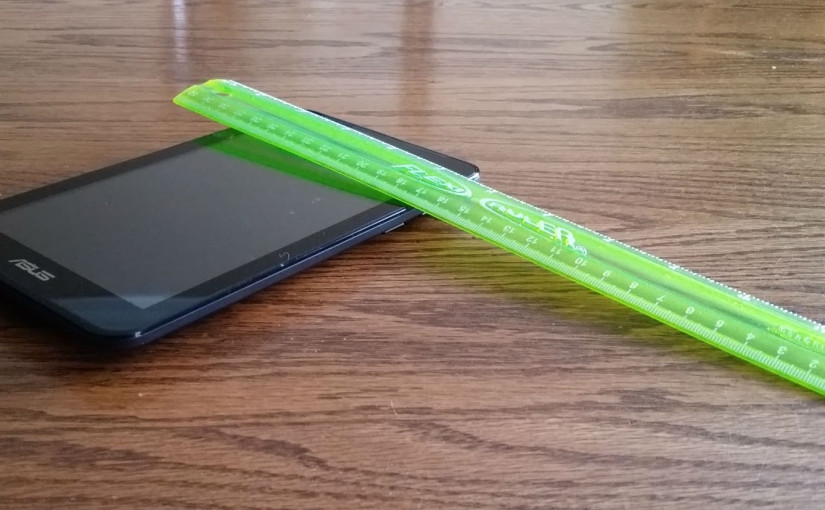I try, as I suppose all parents do, to teach my kids first by telling them, warning them of consequences that are likely to come from certain foolish or careless behavior. Then if the message never does seem to get through, I like to try to bring it home by arranging for my kids get a minor taste of those consequences.
My boys received new tablets for Christmas. And regarding these tablets, as I have with other electronics they already own, I have tried to impress upon them both, “Make sure you put these away when you’re finished playing with them. You cannot leave these things lying around just anywhere, such as in the floor or in a chair or on the couch. Someone will not see them and then step on or sit on them. Then your nice, new tablet will be nice and broken.”
Well, where do you imagine that I found one of those tablets? On the couch, just waiting to be sat on. I decided that this was one of those times that I should let my kids get a brief taste of the consequences I had warned them about. I took the tablet and hid it, waiting for the owner (I didn’t bother to check whose it was) to come looking for it.
Yesterday morning, I heard my youngest—he’s four—asking my wife whether she knew the whereabouts of his tablet, and I thought, “It’s time to strike.” He eventually came asking me if I had seen it, and I decided I would use Nathan’s approach to King David in II Samuel 12 and manufacture a little story to illustrate to my son his folly.
I told him, “Son, there was a tablet lying on the couch—I don’t know whose it was—and I didn’t see it. I ended up sitting on it, and it cracked. I’m sorry, son. No more tablet.” As I was telling him this, I could see his countenance falling, and his eyes beginning to well with tears. Finally, his eyes dropped to the floor, and in perhaps the most pitiable voice I’ve ever heard, he whimpered, “I guess it was mine.”
He was absolutely crushed! And I nearly was, too!
I managed to hold it together long enough to tell him, “OK, son, I’ve got your tablet. It’s fine; it’s not really broken.” I told him that there was not harm done this time, but next time he may not be so lucky. “Come on, son. Let’s go get your tablet.”
After we retrieved his perfectly fine tablet, I could tell he was still upset, and frankly so was I. I scooped him up and held him. I tried to explain why I did what I did: “Son, I just want you to learn to take care of your things. I don’t want to have to give you the news, for real next time, that your tablet is actually broken.” I don’t know whom I was trying to console more: him or myself. At any rate, my hope is that this temporary feeling of loss will stick with him, and the next time—every time, for that matter—he goes to put his tablet down, he’ll remember that time it was “broken” and think to put it someplace safe.
OK, folks, let’s face it. That old saying parents have told their kids about administering punishment, “It hurts me more than it hurts you”: yeah, that’s pretty much bunk. Sorry, maybe I’m a callous jerk, but when I’m swatting a behind for some infraction, if it hurts me more than it hurts them, I ain’t doin’ it right. However, in this case with my four-year-old, perhaps that old lie was actually true. The very reason I’m writing this is because every time I replay the scene in my mind, seeing that utterly devastated look on my son’s face, hearing the abject defeat in his voice, I’m still moved almost to tears.
It reminds me of another occasion. My now ten-year-old daughter was probably two at the time. I can’t remember what she had done. It was not outright rebellion, to the best of my recollection, but it was either something I had just told her not to do or had told her several times in recent days not to do. Whatever it was, I decided a quick, stinging swat to the bare thigh was in order. It took her by surprise, and she turned and looked at me with genuine hurt as she rubbed her thigh. Then she said it: “Daddy.”
I had to choke back a sob.
I don’t know quite how to describe the combination of the look on her face and the tone in her voice. It certainly was not defiance. It also wasn’t as if she thought, “Well, yeah, I guess I deserved that.” It was, I think, disappointment. It was as if she were saying, “You didn’t really have to do that, did you? I didn’t mean any harm.” It was heartbreaking!
I have had no trouble meting out punishment at other times—punishment that, I’m sure, my kids thought they didn’t quite deserve. But for some reason, this time was different. The fact that she seemed genuinely disappointed, apparently in me, that I thought she deserved such a punishment, was almost too much to bear.
“This hurts me more than it does you.” Most of the time, complete rubbish. Still, even a hardened, old disciplinarian like me has to admit that, on occasion, it does perhaps hurt me at least as much as it hurts them.
